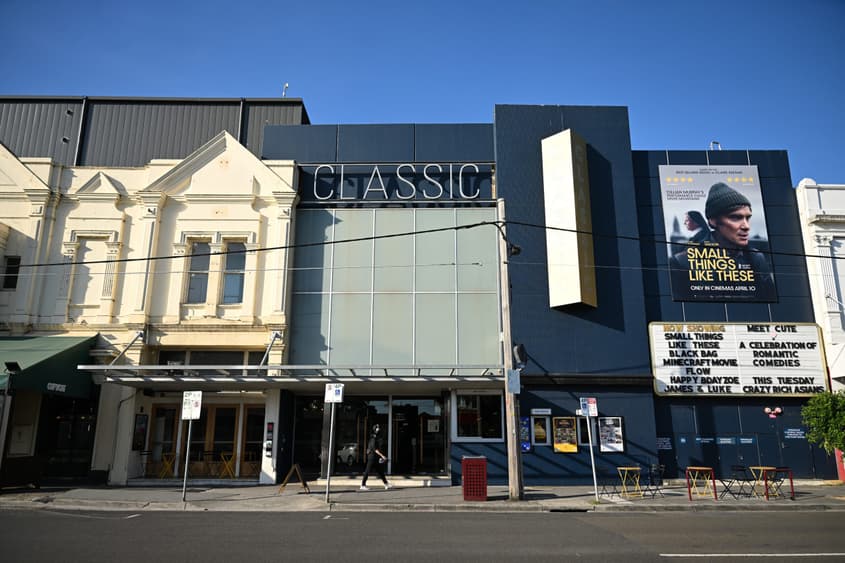Thu 2 Oct 2025 09.00

Photo: AAP Image/James Ross
Sadly, our daily life involves considering every brain fart from the President of the United States. And so, it was again on Tuesday morning we woke to the news that Trump had taken to social media to announce a 100% tariff on all foreign films.
Trump – as is customary – did not provide any details of his policy, but instead posted:
“Our movie making business has been stolen from the United States of America, by other countries … Therefore, in order to solve this long time, never ending problem I will be imposing a 100% tariff on any and all movies that are made outside of the United States.”
Regardless (or perhaps because) of the lack of details, it is not surprising that this worried those in Australia’s film industry.
Each year a bit over $2 billion is spent making film, TV shows and video on demand (ie streaming) programs here. And over the past decade around 43% of that has been foreign productions:
There are a few reasons why foreign films are made here.
Firstly, we have excellent locations and skilled crews. We have the exchange rate that is attractive for US companies (US$1 = A$1.50 is great value).
We also have two tax offsets designed to encourage production.
The first is the Location Offset which is a 30% tax rebate on any foreign production spend in Australia. The second is the 30% PDV Offset (this is essentially visual effects, and post-production work, such as cleaning up the look of the film). (As an aside, when I worked in the public service I used to administer these offsets.)
We also have a Producer Offset which is a 40% rebate for Australian produced films.
These offsets are but one of very many across the world as countries try to entice American and other film and TV production to be done in their location.
So, does Trump have a point? Are we “stealing” US productions?
Not really. The reason these tax offsets became popular is that US states introduced them to entice film and TV production away from California. For example, Louisiana offers a 40% rebate and New York has a 30% rebate. So rife are the rebates that California – home of Hollywood – now offers a 25% rebate.
If Trump wants to put an end to the tax rebate war, sign me up, but it is hardly the case that non-American countries are playing unfair.
But then we get to the problem of the tariff itself.
How would it be administered? A film does not get shipped to the US like a car. And unlike importing a product, importing a service means paying for it in another country (eg paying for a camera operator on a US production in Australia).
How do you put a tariff on a service which at no point involves anyone crossing the border into the USA?
Similarly, while a large amount of foreign production done in Australia is the film “shoot” (eg the production of The Fall Guy), an increasing amount is PDV only – where no physical location shooting is done in Australia, but an Australian company does PDV work for a production filmed in the US.
For example the recent Bob Dylan biopic “A Complete Unknown” was filmed in the USA, but all the PDV work was done by Rising Sun Pictures, which is located in Adelaide.
Would that film be subject to a tariff? If so, how and how much?
It would perhaps be simpler for Trump to put a tariff on the ticket prices of foreign produced and made films – eg a movie like “The Dry”. But how do you do it for a program like Bluey which is streamed on Disney+ and people don’t actually pay for each episode?
Who pays the tariff? When is it paid? What is the cost?
The problem for Trump is even ignoring whether he has the constitutional power to levy the tariff. There does need to be a legal mechanism, and unfortunately for Trump, the only thing there is more of in Hollywood than actors are lawyers.
Hollywood lawyers were able to make the profits of Forrest Gump disappear – a film that earned US$678 million – so have fun getting them to pay a tariff on a service that is unable to be stopped at customs.
I suspect all of this is mostly a warning shot at the studios. A threat to them to be nice to Trump or not only will he prevent any mergers, he will lump them all with a tariff.
But until we see anything remotely concrete, the threat is pretty hollow.
It does however reinforce that our film and TV sectors are very much subject to the whims of madmen in the United States (whether corporate or government) and we should be doing what we can to protect our culture and our workers.
Greg Jericho is chief economist at the Australia Institute.